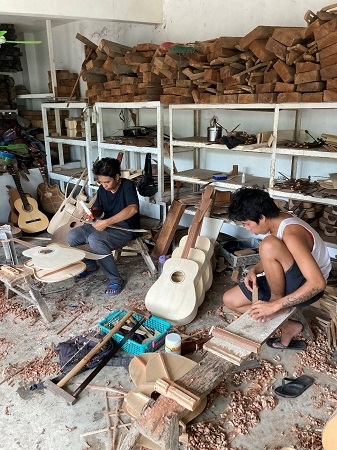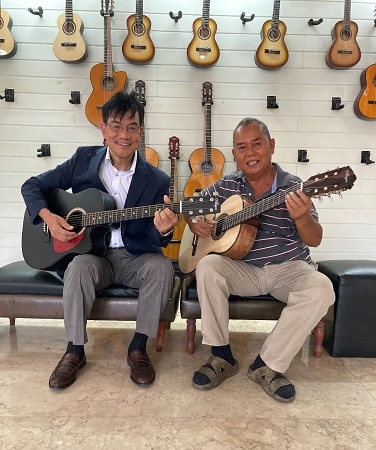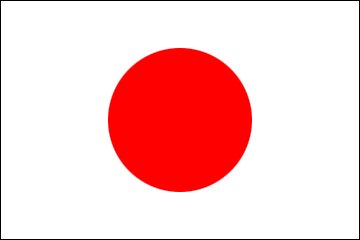Letter from Cebu (11) ”Guitars in the Mactan Island renowned worldwide”
2022/11/9
Letter from Cebu (No.11)
“Guitars in the Mactan Island renowned worldwide”
“Guitars in the Mactan Island renowned worldwide”
Lapu-Lapu City in the Mactan Island, just east of Cebu, is famous for producing world-class handmade guitars of melodious tones and beautiful designs. Information on the internet says that guitars were first introduced to the island by Spanish friars during the Spanish Era. As time passed by, their instruments wore out. Sending them to Mexico through the so-called Galleon trade (two round-trip voyage per year between Acapulco and Manila) for repairs seemed to be time-consuming and impractical. So, they asked locals from Lapu-Lapu to repair and replicate their instruments. This had become one of the oldest industries in Cebu and Lapu-Lapu City.
I had two questions about this explanation. One is time. The Galleon trade lasted from 1572 to 1815. The trade ended when Mexico became independent. But, it was in the 1850s that famous Spanish Luthier, Antonio de Torres Jurado made modern classical guitars in Seville, Spain. Modern classical guitars were created at least 35 years after the Galleon trade ended. The other question is place. The Galleon Trade was conducted between Acapulco and Manila. Then, why did Lapu-Lapu City, not Manila, become the first place to repair and replicate guitars?
Furthermore, I came up with another question. Guitar makers in Lapu-Lapu City started from repairing and replicating guitars that Spanish introduced to the island. But, I do not understand how the makers has developed into manufacturing world-class guitars. What has made the guitar makers famous worldwide? Is it the quality of wood they used or the skills of the luthiers?
In order to find answers to these questions, few week ago, I visited the Alegre Guitar Factory, one of the remarkable guitar-makers located in Abuno, Lapu-Lapu City, the Mactan island. Mr Fernando M Alegre, the owner and manager of the Factory welcomed me. He said Alegre family is one of the pioneers in the guitar-manufacturing business, and he is on its third generation proprietorship. His explanation, especially the third generation, seems to suggest that guitar-manufacturing of the island is started one hundred and twenty or thirty years ago at the oldest, not the age of the Galleon trade that ended about two hundred years ago.
But, it seems to be true that Spanish friars asked locals to repair their guitars, which marked the beginning of the guitar-manufacturing in the island. I posed a question, “Why Cebu and Lapu-Lapu city, not Manila?”. He replied that Cebuanos are known for their love of music, and there must have been a strong demand for guitars in the island. It seems to me that most Filipinos are music lovers, but Cebuanos may be especially so, because they have a good taste in music.
I asked him a question, “How did guitars in the Mactan island become famous worldwide?” His reply was that “In order to make good guitars, you need good guitar players.” Good guitar players can understand the sound quality of the guitar, and ask luthiers to introduce new bracing (the system of wooden struts which internally support and reinforce the soundboard) designs, and to select new wooden materials, and tell them how to rebuild the guitar. In the 1960s, the Mactan Island produced several world-class guitar players, and they helped the guitars in the island to become a world level.
In addition, comments made by top guitar players in the world are important for the reputation of guitars. When a top guitarist praises the quality of guitars made in the island, the reputation of the guitars surged, according to Mr. Alegre.
On the other hand, guitars in the island use both local woods (eg. jackfruit, narra, ebony, mahogany, acacia and mango wood) and imported woods (eg. Spruce, cedar, rosewood and koa wood). Local woods themselves do not affect the sound quality, according to him.
In any case, he welcomed my visit. He said that he frequently communicated with guitar musicians in Japan, since guitars in the island had good reputation. He played a Japanese song, “Shikuramen-no-kaori (the smell of cyclamen)” for me. He said that Japanese songs in the 1960s and 70s are very melodious. I hope that the island continues to produce excellent guitars in the future.
(Handmade guitar manufacturing at Alegre Guitar Factory)

(Mr. Fernando M Alegre and the author)

Hideki YAMAJI
Consul General of Japan in Cebu
(end)
(end)
